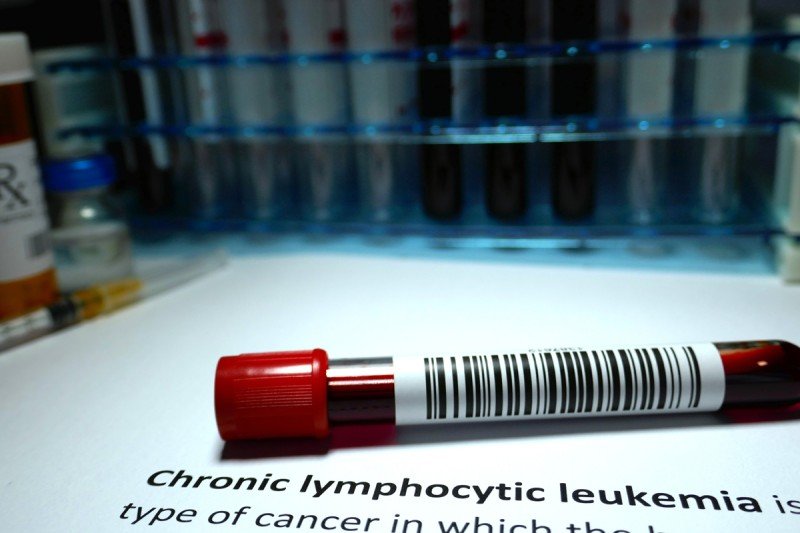
Prognostic genetic testing is recommended for all patients with chronic lymphocytic leukemia (CLL) to inform disease management and predict survival and disease progression.
However, recent research shows that among almost 1,500 patients with CLL who were treated in a community setting, testing was infrequently performed and outcomes were poorer in patients with unfavorable disease risk. (1)
In this multicenter study, we discovered that patients with high-risk gene mutations who were treated with immunotherapy combinations as the first line of therapy had inferior event-free survival compared with favorable-risk patients (hazard ratio 1.60; p = .001).
We analyzed patterns of prognostic genetic testing and outcomes for the 1,494 patients enrolled in the Connect CLL registry by line of therapy, the largest ongoing prospective study of disease management of patients with CLL in the United States. Cytogenetic/fluorescence in situ hybridization (FISH) testing was performed in only 861 patients (58 percent) at enrollment, and just 40 percent of those patients were retested before beginning a subsequent line of therapy. (1) These findings underscore the importance of offering genetic testing to all patients with CLL at diagnosis and upon initiation of the first and subsequent lines of therapy.
Chronic Lymphocytic Leukemia
CLL is the most common leukemia in American adults, with an estimated 60,300 new cases and 4,510 deaths in 2018. It develops most commonly in older adults. The symptoms include persistent fevers, night sweats, and unexplained weight loss; however, many individuals are asymptomatic at the time of diagnosis. About one-third of diagnosed patients have indolent disease that never requires treatment, while over time many others develop aggressive disease that requires intervention.
The presence of genetic mutations, such as deletion 17p or deletion 11q, or the absence of a mutation in the immunoglobulin heavy chain variable region (IgHV) gene can provide essential information for determining the optimal selection of immunochemotherapy, kinase inhibitors, BCL2 inhibitors, or rarely, stem cell transplantation. Stem cell transplantation is used for only a small number of patients who are resistant or refractory to all other treatment options and is the only therapy today with curative potential. Preexisting molecular markers can also inform eligibility for entry into clinical trials for targeted therapies. (2)
Deletion 17p, for example, results in a loss of the TP53 tumor suppressor gene, causing resistance to chemotherapy and an increased risk of Richter transformation — the development of an aggressive lymphoma, such as diffuse large B cell type or, less commonly, Hodgkin lymphoma. (2) The mutation affects less than 5 percent of patients at first diagnosis, but that figure rises to about 10 percent when therapy is first required, then to greater than 40 percent for relapsed or refractory patients. (3)
Targeted Therapies for Improved Outcomes
In the early stages of CLL, chemotherapy is usually avoided due to its side effects. Three targeted, nonchemotherapy approaches have been approved for CLL in the last few years by the US Food and Drug Administration: ibrutinib, venetoclax and idelalisib . They are also highly effective in patients who are relapsed or refractory to standard treatment with immunochemotherapy. Experts at Memorial Sloan Kettering Cancer Center participated in the ground-breaking clinical trials for all three of these oral agents.
In July 2014, the FDA granted a Breakthrough Therapy Designation to ibrutinib, a first-in-class inhibitor of Bruton tyrosine kinase, for treating deletion 17p CLL. The drug has revolutionized the treatment of patients with this gene mutation. In a recent analysis of three clinical trials for patients with relapsed or refractory deletion 17p CLL who were treated with ibrutinib, we observed robust results: The overall response rate was 85 percent, and the estimated 30-month progression-free survival and overall survival rates were 57 percent and 69 percent, respectively. (3)
CLL researchers at multiple centers continue to conduct studies to advance learning in the field. In a paper published recently in The Lancet Oncology, I collaborated with other CLL experts on an interim analysis of a multicenter, open-label phase II trial of venetoclax for CLL progressing after ibrutinib. Ninety-one patients had received ibrutinib as the last B cell receptor inhibitor therapy before enrollment and were treated with venetoclax. The drug demonstrated substantial clinical activity, with 65 percent of participants experiencing an overall response. We will assess the durability of the response in the final analysis in 2019. (3)
In another recent study, a retrospective cohort analysis of 141 patients with refractory or relapsed CLL who were treated with venetoclax, my colleagues and I found that dose escalation to the maximum recommended dose was achieved in 85 percent of patients. The overall response rate was 72 percent, and 19.4 percent of patients achieved complete remission, in line with the clinical trial data. Median progression-free survival and overall survival for the entire cohort had not been reached at a median follow-up of seven months. Interestingly, the drug was active in patients with mutations associated with resistance to ibrutinib, suggesting that optimal sequencing of newer targeted therapies requires further study. This study — conducted by researchers from 21 cancer centers, including Lindsey Roeker, MD, and Andrew Zelenetz, MD, PhD, both from MSK — represents the most extensive clinical experience of venetoclax-treated CLL patients to date. (4)
Advancing CLL Research and Patient Care
More than four years ago, the cancer genomics company Foundation Medicine and MSK co-developed a state-of-the-art genetic test, utilizing next-generation sequencing, that identifies more than 400 gene mutations associated with blood cancers. The test, called MSK-IMPACT™, allows doctors to make more accurate prognoses and develop a personalized treatment plan for each patient.
I recently joined MSK to lead the CLL program. The commitment to research and patient care by the multidisciplinary experts in MSK’s Division of Hematologic Oncology and the Leukemia Service were key factors in my decision. MSK specialists evaluate and treat several hundred cases of CLL annually.
At MSK, there is a commitment to advancing clinical research to find new ways to improve patient outcomes. Currently, we are conducting eight clinical trials for patients with recurrent or persistent CLL:
- seven phase I studies of investigational agents (TGR-1202 and pembrolizimab; SNS-062, BTCT4465A, ME-401, MRG-106, PRT062070, and TTI-621)
- a phase I trial of CAR T therapy, which involves modifying a patient’s T cells to enable them to live longer in the body, with the objective of achieving faster remission and longer survival times
- a phase II study of cyclophosphamide to prevent rejection after a mismatched unrelated bone marrow transplant in patients with blood cancers (adult patients with CLL receiving this type of transplant are eligible)
- a pilot study assessing stem cell transplantation from a half-matched related donor using KIR genes and other factors (adult patients with CLL receiving this type of transplant are eligible)
Several additional trials are planned in the coming months.
